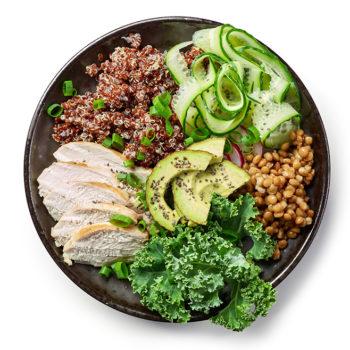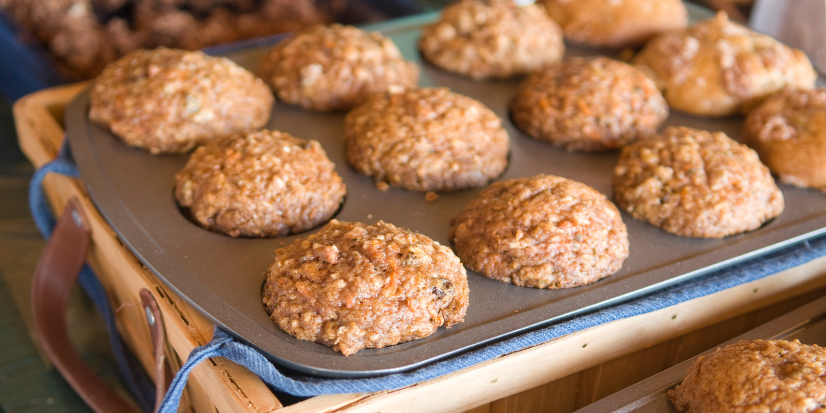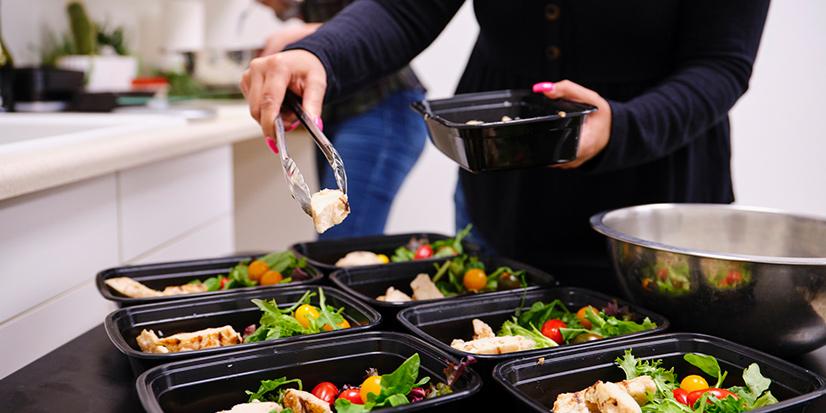Whether you’ve fallen off the wagon for weeks, months, or years, it is never too late to start making healthier choices. Do yourself a favor and start now. Not tomorrow, not Monday, but now. No more “I’ll start next week,” because we all know how that saying goes.
The good news is, you don’t have to do anything drastic to lose weight or reach your health and wellness goals. Unfortunately for dieters who tend to go “all in” or “all-out”, going to the extremes often tends to backfire and results in the vicious diet cycle:
Diet → Restriction → Deprivation → Craving → Giving In → Weight Gain → Guilt → Diet
No more dieting!
5 tips to lose weight without dieting
1. Don’t drink your calories.
Unless your goal is to gain weight, strongly consider eliminating liquid calories from your diet. Most beverages are packed with added sugars, which promote both weight gain and obesity. Say goodbye to juice, bottled smoothies, soda pop, specialty coffee drinks, and alcohol. Your new best friend is water. Replacing sugary beverages with water is one of the easiest ways to cut back on hundreds of calories from sugar.
Additionally, drinking water has been shown to reduce appetite and increase metabolism. Being adequately hydrated helps enhance focus, memory, learning and in the sports world, reaction time, agility, and movement. Yet, Americans only consume an average of four cups of water daily; this is significantly lower than what most people need in order to be hydrated.
As kids, we learned that we should drink eight 8-ounce glasses of water per day. Though 8×8 is easy to remember, it doesn’t hold true for everyone. To determine how many ounces of water you need per day, take your body weight in pounds and divide by two. This number is your minimum daily goal, though active individuals or athletes should aim to double it (1 oz/pound).
Other than water, healthy beverage options include unsweetened milk, black coffee, unsweetened tea, and naturally flavored sparkling water such as La Croix.
2. Pack & snack.
Ever find yourself hungry between meals and scavenging for just about anything edible? We all know what happens next. You find the nearest vending machine, snack bar, gas station, or… evil candy drawer!
“Hanger” causes most people to choose chips, chocolate, pop, energy drinks, or candy rather than a nutritious, balanced snack that will satisfy you until your next meal.
In order to avoid this situation, plan and prepare your snacks ahead of time. For example, take 15 minutes on Sunday evening to prepare your snacks for the work week ahead. Consider pairing your favorite fruit or veggie with a protein or healthy fat source:
- Carrots + hummus
- Grapes + string cheese
- Almond butter + celery
- Peanut butter + banana
- Apple + almonds
- Pineapple + cottage cheese
- Greek yogurt + berries
Planning and packing snacks ahead of time will allow you to make a stress-free, healthy choice. Lastly, our bodies can sometimes confuse hunger for thirst, so before making an impromptu snack-related decision, try drinking water first.
3. Cut back on sugar.

Added sugars are hiding everywhere. Although they are listed on nutrition labels, it can be tricky as sugar can be found under 50 different names. Many packaged foods that appear healthy, such as marinara sauce and nutrition bars, contain added sugars. Take that extra 30 seconds to scope the ingredients list for added sugars.
Men and women should eat less than 9 and 6 teaspoons per day, respectively. However, adults and teenagers consume an average of 22 teaspoons (½ cup) and 34 tsp (¾ cup) of added sugar daily. You may be wondering where all this sugar is coming from? It’s hiding in your favorite snacks, beverages, and condiments, such as:
- Low-fat yogurt
- Sports drinks
- BBQ sauce
- Flavored coffee
- Chocolate milk
- Canned fruit
- Ketchup
- Spaghetti sauce
- Granola bars
- Juice
Avoid foods that have some form of sugar listed among the top three ingredients. Though there are dozens of names for sugar, just remember: sugar is sugar. Organic sugar is sugar. Dextrose, honey, molasses, organic brown rice syrup… it’s all sugar.
4. Shrink your plate.

The size of your plates, bowls, and containers can impact the amount of food you consume. Think about the last time you dined at a buffet; if the plates were bigger, you’d probably come back to the table with way more food, right? Individuals have reported that swapping larger plates for smaller plates at home has helped them reduce portion sizes and even lose weight. Speaking of portion sizes, here’s how you should go about filling your plate:
- Start by filling half your plate with vegetables (1.5-2 cups).
- Add 3-6 oz. of lean protein (size of the palm of your hand).
- Add minimally processed starches (yams, potatoes) and whole grains (brown rice, quinoa); the portion should be no bigger than the size of your fist (1-2 cups).
- Wait 10 minutes before helping yourself to a second serving. It takes time for your brain to realize you’re satisfied.
5. Focus on habits, not diets.
Have you found yourself dieting more than twice in the same year? If yes, this is a sign that you need to stop following diets that bring more guilt than results. Here’s the thing: research shows the average diet only lasts three weeks. Dieting is not a long-term solution.
Did you know it takes 21 days to form a habit? Instead of following some crazy diet for three weeks, focus your energy on creating a healthy habit for 21 days. Keep it simple—reduce your pop intake from three cans to one, or add a serving of veggies to your dinner every night. Over time, it will become a habit. Set a reminder on your phone or place a post-it note on your mirror. After 21 consecutive checkmarks, it should be second nature. That’s when you move on to the next one!







